新目标人教版八年级英语下册Unit1Unit5复习
人教新目标八年级英语下册Unit5知识点复习练习
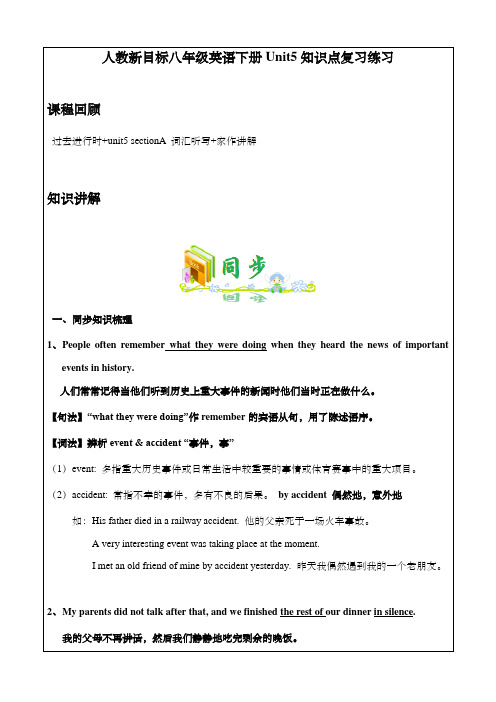
人教新目标八年级英语下册Unit5知识点复习练习课程回顾过去进行时+unit5 sectionA 词汇听写+家作讲解知识讲解一、同步知识梳理1、People often remember what they were doing when they heard the news of importantevents in history.人们常常记得当他们听到历史上重大事件的新闻时他们当时正在做什么。
【句法】“what they were doing”作remember的宾语从句,用了陈述语序。
【词法】辨析event & accident “事件,事”(1)event: 多指重大历史事件或日常生活中较重要的事情或体育赛事中的重大项目。
(2)accident: 常指不幸的事件,多有不良的后果。
by accident 偶然地,意外地如:His father died in a railway accident. 他的父亲死于一场火车事故。
A very interesting event was taking place at the moment.I met an old friend of mine by accident yesterday. 昨天我偶然遇到我的一个老朋友。
2、My parents did not talk after that, and we finished the rest of our dinner in silence.我的父母不再讲话,然后我们静静地吃完剩余的晚饭。
mean to do sth. “打算或企图做某事”如:What do you mean to do with it? 你打算把它怎么处理?What do/did you mean by …? 句型的意思是“你……是什么意思?”如:What do you mean by acting like this? 你这样做是什么意思。
最新人教版八年级下册英语-Unit1-5-单元笔记+练习

最新人教版八年级下册英语-Unit1-5-单元笔记+练习八年级下册Unit 1 单元笔记1. People will have robots in their homes. 人们家里将会有机器人。
will助动词,表单纯的未来。
用于陈述句表“将……,会……”。
e.g. I will (I'll) be 15 next month.下个月我就15岁了。
Mr. Green will be back soon.否定句:won't = will not eg. He won't be back before 10.will用于疑问句意为“会……吗?”e.g. Will you be free on Friday evening?Will people have robots?2. There will only be one country.将会只有一个国家。
There will be 是there be句型的将来时。
e.g. There won't be any paper money. (否定)Will there be less pollution? (疑问)Yes, there will./ No, there won't.There will be more people. (肯定) ※常见错误:there will have…3. I think there will be more / less pollution. 我认为将会有更多/更少的污染。
fewer 与less及more表数量的用法。
(1)few(形容词)“几乎没有,很少的”,修饰可数名词。
其比较级、最高级为规则变化:few-fewer-fewest。
“a few”表示“一些”,“few”带否定含义,“几乎没有”。
例:a few days ago, for a few weeks,He has few friends here. There will be fewer trees.(2)little(形容词)“很少的,几乎没有的”(“小的,幼小的”),修饰不可数名词。
人教版英语八年级下册Unit 1-5 单元语法知识梳理
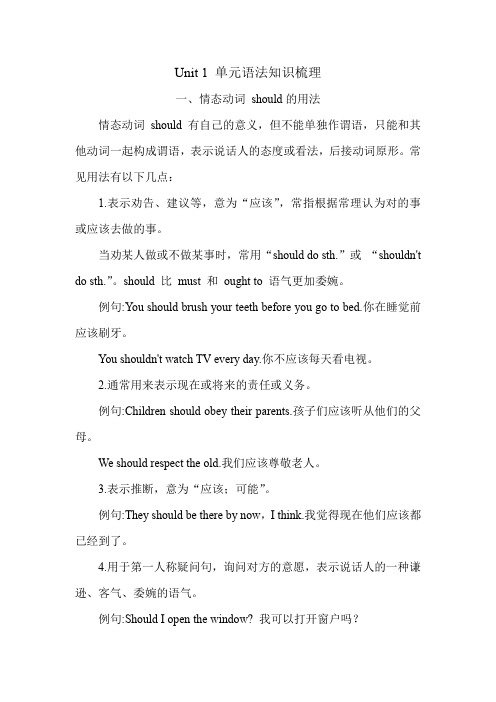
Unit 1 单元语法知识梳理一、情态动词should的用法情态动词should有自己的意义,但不能单独作谓语,只能和其他动词一起构成谓语,表示说话人的态度或看法,后接动词原形。
常见用法有以下几点:1.表示劝告、建议等,意为“应该”,常指根据常理认为对的事或应该去做的事。
当劝某人做或不做某事时,常用“should do sth.”或“shouldn't do sth.”。
should 比must 和ought to 语气更加委婉。
例句:You should brush your teeth before you go to bed.你在睡觉前应该刷牙。
You shouldn't watch TV every day.你不应该每天看电视。
2.通常用来表示现在或将来的责任或义务。
例句:Children should obey their parents.孩子们应该听从他们的父母。
We should respect the old.我们应该尊敬老人。
3.表示推断,意为“应该;可能”。
例句:They should be there by now,I think.我觉得现在他们应该都已经到了。
4.用于第一人称疑问句,询问对方的意愿,表示说话人的一种谦逊、客气、委婉的语气。
例句:Should I open the window? 我可以打开窗户吗?What should we do now? 我们现在该干什么呢?5.表示某种感情色彩,意为“竟会”,常用于以how, why开头引导的特殊疑问句中。
例句:Why should you be so early today? 你今天为什么会如此早?二、反身代词1.反身代词的构成反身代词是一种表示反射或强调的代词。
它由第一人称、第二人称的形容词性物主代词和第三人称代词的宾格加词尾-self或-selves构成。
其构成如下表:反身代词与它所指代的名词或代词形成互指关系,两者在人称和数上应保持一致。
最新版本新目标英语八年级下册Unit_1-unit5期中复习重点短语和句子
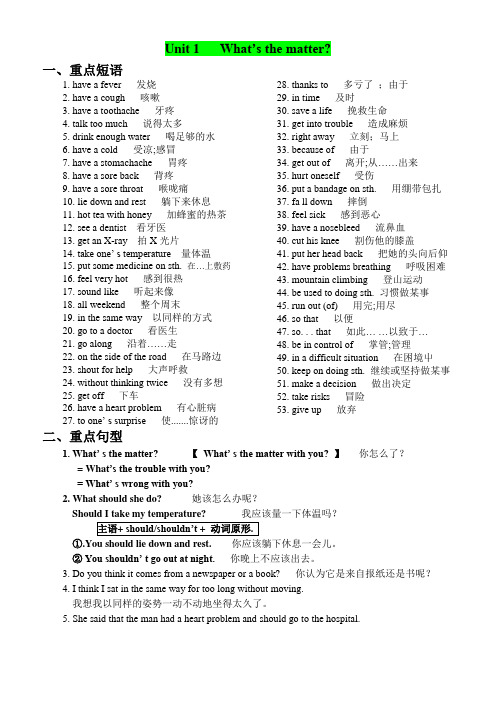
Unit 1 What’s the matter?一、重点短语1. have a fever 发烧2. have a cough 咳嗽3. have a toothache 牙疼4. talk too much 说得太多5. drink enough water 喝足够的水6. have a cold 受凉;感冒7. have a stomachache 胃疼8. have a sore back 背疼9. have a sore throat 喉咙痛10. lie down and rest 躺下来休息11. hot tea with honey 加蜂蜜的热茶12. see a dentist 看牙医13.get an X-ray 拍X光片14. take one‟ s temperature 量体温15. put some medicine on sth. 在…上敷药16. feel very hot 感到很热17. sound like 听起来像18. all weekend 整个周末19. in the same way 以同样的方式20. go to a doctor 看医生21. go along 沿着……走22. on the side of the road 在马路边23. shout for help 大声呼救24. without thinking twice 没有多想25. get off 下车26. have a heart problem 有心脏病27. to one‟ s surprise使.......惊讶的28. thanks to 多亏了;由于29. in time 及时30. save a life 挽救生命31. get into trouble 造成麻烦32. right away 立刻;马上33. because of 由于34. get out of 离开;从……出来35. hurt oneself 受伤36. put a bandage on sth. 用绷带包扎37. fa ll down 摔倒38. feel sick 感到恶心39. have a nosebleed 流鼻血40. cut his knee 割伤他的膝盖41. put her head back 把她的头向后仰42. have problems breathing 呼吸困难43. mountain climbing 登山运动44. be used to doing sth. 习惯做某事45. run out (of) 用完;用尽46. so that 以便47. so. . . that 如此… …以致于…48. be in control of 掌管;管理49. in a difficult situation 在困境屮50. keep on doing sth. 继续或坚持做某事51. make a decision 做出决定52. take risks 冒险53. give up 放弃二、重点句型1. What’ s the matter?【What’ s the matter with you?】你怎么了?= Wha t’s the trouble with you?= What’ s wrong with you?2. What should she do? 她该怎么办呢?Should I take my temperature? 我应该量一下体温吗?①.You should lie down and rest. 你应该躺下休息一会儿。
人教版八年级英语下Unit1-5重点短语归纳

八年级下Unit1-5重点短语及句型集锦Unit 1短语:1. A be different from B,A与B不同(=There is a difference/Thgere are differences betweenA and B)2.agree with sb.同意某人(的意见)3.Are you kidding?你在骗我吗4.as a reporter作为一名记者5.at the weekends在周末6.be able to 能,会7.be fun to watch 看起来有趣8.be in college 在上大学9.be in different shapes形状不同10.besides(除…之外还,包括)与except =but(除…之外,不包括)e true 实现,成为现实puter programmer 电脑程序员13.fall in love with… 爱上……14.feel lonely感到孤独(比较:live alone/go along等)15.fewer people更少的人(fewer修饰名词复数,表示否定)16.fly to 飞往17.free time 空闲时间18.get bored 变得厌倦(get/become是连系动词,后跟形容词如tired/angry/excited等)19.go skating去滑冰(类似还有go hiking/fishing /skating/bike riding等)20.help (sb.) with sth. 帮助(某人)做某事21.help sb with sth/help sb do sth帮助某人做某事22.high school 高中23.hundreds of +复数,数百/几百(概数,类似还有thousands of; millions of)24.I don’t agree. = I disagree. 我不同意25.in 100 years 一百年后26.in ten years 10年后(in的时间短语用于将来时,提问用How soon)27.in the future在将来/在未来28.job interview 工作面试29.keep a pet pig 饲养一头宠物猪30.less free time更少的空闲时间(less修饰不可数名词,表示否定)31.live alone单独居住feel lonely感到孤独32.live to (be) … years old 活到……岁33.look smart显得精神/看起来聪明34.lots of/a lot of许多(修饰可数名词、不可数名词都可以)35.no longer=not… any longer不再(强调状态不再发生)36.no more=not …anymore 不再(强调多次发生的动作不再发生)37.on a piece of paper在一张纸上(注意paper/information/news/work/homework/housework等常考到的不可数名词)38.on vacation 度假39.one’s own … 某人自己的……40.over and over (again) 一次又一次,再三地41.see sb. do sth. 看见某人做了某事42.space station 太空站43.study at home on computers在家通过电脑学习44.talk about 谈论,谈及,谈到45.talk to/with 和……交谈46.the same as和……相同47.try to do sth. 试图做某事,尽力做某事48.twenty years from now 今后20年49.wake up 醒来wake sb. up表示“唤醒某人”句型:1.What do you think life will be like in 1000 years?2.There will be fewer trees、more buildings and less pollution in the future.3.Will kids go to school? No, they won’t/Yes, they will。
人教版英语八年级下Unit1-5复习

watch TV run
Who/What do you think is the… best fast food?
cleverest student?
Student’ Student’ Student’ s name s name s name
most boring subject? worst movie?
3.
4. 5.
A: What do you like to do? B: I like to eat hamburgers every day.
A: If you eat hamburgers every day, you’ll get fat.
eat hamburgers read books play football
A: Yes, they are.
2. When it happens, the earth will shake. (earthquake)
A: When it happens, the earth will shake.
B: Is it earthquake?
A: Yes it is.
3. You take a bath in it. (bathroom)
s
21 h
e
22d 23a
e
n 24c e
19m 20a
t
k
i n i n t s t a n
d
1. Kids study at home on them. (computers) A: Kids study at home on them. B: Are they computers?
Join a club or a sports team.
人教版八年级下册英语 Unit 1-5 复习知识点考点汇编
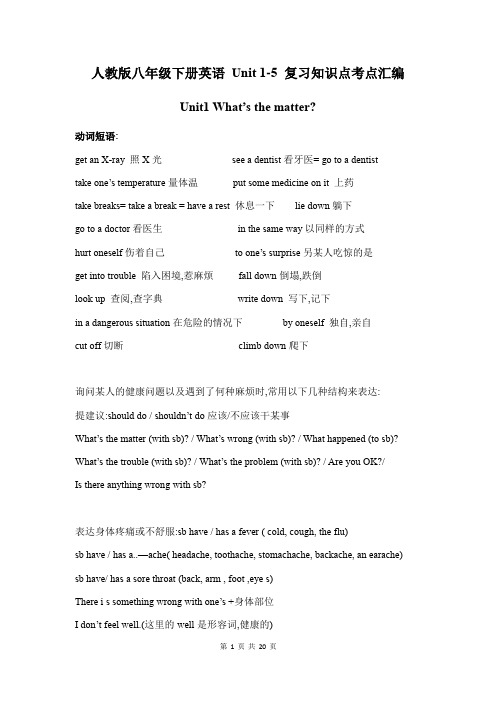
人教版八年级下册英语U nit 1-5 复习知识点考点汇编Unit1 What’s the matter?动词短语:get an X-ray 照X光see a dentist看牙医= go to a dentist take one’s temperature量体温put some medicine on it 上药take breaks= take a break = have a rest 休息一下lie down躺下go to a doctor看医生in the same way以同样的方式hurt oneself伤着自己to one’s surprise另某人吃惊的是get into trouble 陷入困境,惹麻烦fall down倒塌,跌倒look up 查阅,查字典write down 写下,记下in a dangerous situation在危险的情况下by oneself 独自,亲自cut off切断climb down爬下询问某人的健康问题以及遇到了何种麻烦时,常用以下几种结构来表达:提建议:should do / shouldn’t do应该/不应该干某事What’s the matter (with sb)? / What’s wrong (with sb)? / What happened (to sb)? What’s the trouble (with sb)? / What’s the problem (with sb)? / Are you OK?/Is there anything wrong with sb?表达身体疼痛或不舒服:sb have / has a fever ( cold, cough, the flu)sb have / has a..—ache( headache, toothache, stomachache, backache, an earache) sb have/ has a sore throat (back, arm , foot ,eye s)There i s something wrong with one’s +身体部位I don’t feel well.(这里的well是形容词,健康的)Let’s +动词原形./ What (How) about doing sth ? / Why not ( Why don’t you ) do? You’d better do / You’d better not do 最好干某事/最好不要干某事too much + 不可数名词:too much homework 动词+too much : talk too muchtoo many+可数名词复数:too many students much too + adj/ adv : much too tiredhot tea with honey 加蜂蜜的热茶(这里的with是后置定语,修饰tea)away from :远离Stay away from fire.远离火A地离B地的具体距离具体的距离+away from : My home is 500 meters away from my school.Far from:A地离B地很远My home is far from my school.(具体多远不知道)lie 动词,躺、位于,过去式lay , 过去分词lain, 现在分词lying动词,说谎,过去式lied, 过去分词lied, 现在分词lying名词,谎言tell a lie = tell lies说谎lay 动词,下蛋,产卵,放置,过去式laid, 过去分词laid, 现在分词layingsee sb doing sth看见某人正在干某事see sb do sth看见某人干某事的全过程shout for help 大声呼救shout at sb对某人大喊大叫shout to sb对某人大声说话without thinking twice毫不犹豫,不假思索get on 上车get off 下车(大型交通工具)get into / get out of (电梯、出租车等小型交通工具)expect sb to do sth期待某人干某事expect sb not to do sth期待某人不要干某事agree to do sth同意干某事thanks to 多亏了,幸亏= because of = with the help ofin time 及时on time 按时,准时right away=right now = at once立即马上think of想起,认为think about 考虑think about doing sth考虑干某事think over 仔细考虑hit sb in / on +身体部位(软的部位用in,硬的部位用on)run it under water用水冲洗put a bandage on it 用绷带包扎Knives are used to cut things.have trouble (in) doing sth = have problems/difficulty (in) doing sth干某事有麻烦/问题/ 困难have trouble with sth= have problems with sth = have difficulty with sth在某方面有困难be / get used to doing sth 习惯于干某事I am used to getting up early.我习惯了早起used to do sth过去常常干某事(暗示现在不干了)I used to get up early. (暗示现在不。
新目标(人教)八年级下册英语单元复习课件 unit 5 复习课件
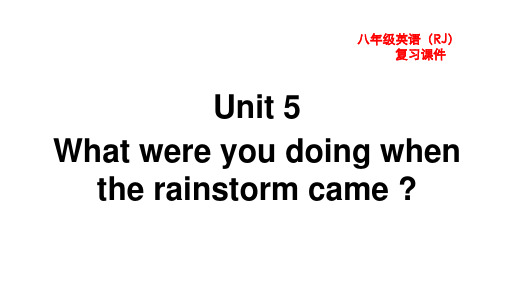
21. 向外看 _b__y_t_h__e__s_id__e of the road
the rest of
look out of
三、核心句型
1.本的爸爸正把一块块木头钉到窗户上,同时他的妈妈在确认手电
筒和收音机都能正常使用。
Ben's dad _w_a__s__ _p_u_t_t_i_n_g_ pieces of wood _o__v_e_r__ the windows _ww_e_h_rie_l_ew_ ohriskimngo.m _w_a__s _m__a_k_i_n_g_ _s_u__re___ the flashlights and radio 2. 暴风雨来的时候你在干什么? What ______ you ________ ________ the rainstorm came?
after that. so scared that
hardly think clearly
6.当校篮球赛开始时,凯特还在去学校的路上。
_W__h__e_n___ the school basketball competition started, Kate ______ still _________ ________ ________ to school. 7.那件事w后as我很难m清a楚ki地ng思考h,er因为我w非a常y 害怕。 I ______ __________ _________ clearly after that because I was very afraid.
【易混辨析】beat与win
beat
意为“打败”,指在游戏或比赛中击败对手,其宾语是比赛或竞 争的对手,如球队、人等。
win
意为“获胜;赢;赢得”,指在竞赛或战争中获得胜利,其宾语 多为表示比赛、战争、奖品、金钱或奖牌等。
最新人教版八年级下英语期中复习知识点讲义(Unit1-Unit5)

最新人教版八年级下英语期中复习知识点讲义(Unit1-Unit5)Unit 1: What's the Matter?In this unit。
we will focus on two grammar points: the use of the modal verb "should" and reflexive pronouns。
We will also discuss the topic of health in our writing。
Here are some XXX:1."Have a + disease" (e.g。
"have a cold")2.XXX: "What's wrong?" "What's wrong with you?" "What's your trouble?" "What's the trouble with you?"3."Lie" can mean both "to recline" (e.g。
"She should lie down") and "to tell a falsehood" (e.g。
"She lied again")。
"Lay" means "to put something down" (e.g。
"The hen is laying an egg").4.XXX with "if" (e.g。
"If I have time。
I will go to the gym").5."Surprise" can be used as a verb (e.g。
人教版英语八年级下Unit1-5单元复习课件
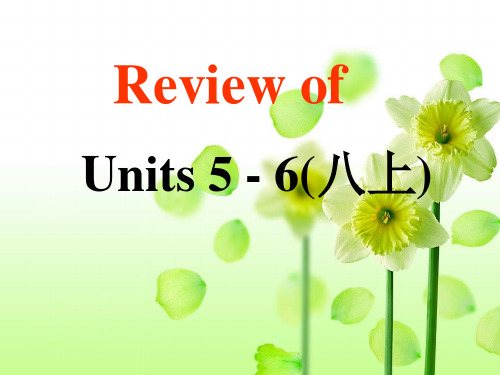
选择填空。 C 1.The mother used to __________ her daughter like a beautiful flower. 2. People have to _________ A warm clothes in winter. A. wear B. put on C. dress D. in
根据要求完成下列小题
1. He makes us____________ laugh (laugh). 2. 将上一句变为被动语态。 __________________________. We are made to laugh.
Writing
最近 ,我们学校开展了以“中国 梦,我的梦”为主题的活动,作 为一名中学生我们应该有自己的 梦想,你的梦想是什么呢?请以 “My dream ”为题写一篇英语短 文。 Disscus: 1.梦想是什么 2.为什么拥有这样的梦想 3.为了梦想将采取什么措施
no money to buy a hair clip. 2.Her mother didn't like the little girl ,either.
3.Most of the schoolmates liked her beautiful hair clip very
much on that day. 4.Her mother found the clip by the door after the girl went to school. 5.It is not important what we wear or how we look.
Relay Race(接力赛)
If I don’t finish my homework, …
人教版八年级英语下册1-5单元复习教案
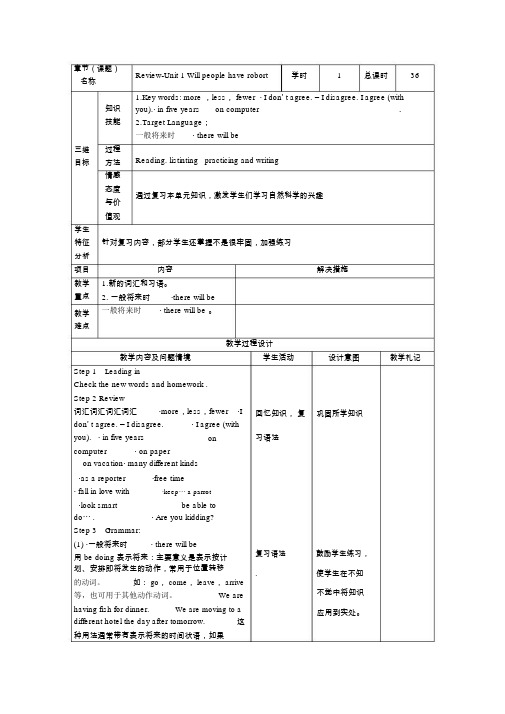
章节(课题)名称知识技能Review-Unit 1 Will people have robort学时1总课时361.Key words: more ,less, fewer · I don’ t agree. = I disagree. I agree (with you).· in five years on computer.2.Target Language;一般将来时· there will be三维目标学生特征分析项目教学重点教学难点过程方法Reading. listinting practicing and writing情感态度通过复习本单元知识,激发学生们学习自然科学的兴趣与价值观针对复习内容,部分学生还掌握不是很牢固,加强练习内容解决措施1.新的词汇和习语。
2. 一般将来时·there will be一般将来时· there will be 。
教学过程设计教学内容及问题情境学生活动设计意图教学札记Step 1Leading inCheck the new words and homework .Step 2 Review词汇词汇词汇词汇·more,less,fewer·I回忆知识,复巩固所学知识don’ t agree. = I disagree.· I agree (withyou). · in five years on习语法computer· on paper·on vacation· many different kinds·as a reporter·free time· fall in love with·keep⋯a parrot·look smart be able todo⋯ .· Are you kidding?Step 3 Grammar:(1) ·一般将来时· there will be用 be doing 表示将来:主要意义是表示按计划、安排即将发生的动作,常用于位置转移的动词。
人教版新目标八英语_下期1到5单元复习精品课件
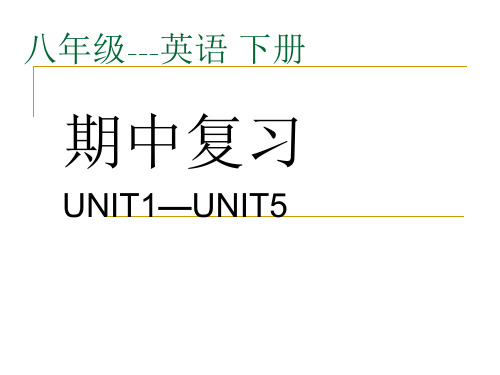
(向某人)道歉 Say sorry (to sb)=say you are sorry 一张球赛票 A ticket to a ball game 大声地播放CD Play CDs too lound 获得一份兼职 Get a part-time job 我也不哭 I don‘t cry ,either
try to do sth. 尽力做某事 look like seem like 似乎 看上去长的像… look for 寻找 一段时间 + from now (从现在 起)…之后 from now on = in the future 今后
尽力做某事 try to do sth. 看上去长的像… look like 寻找 look for 一段时间 + from now (从现在 起)…之后 今后 from now on = in the future
句型.知识点 1.Sb. pay …for sth. 某人为某物花了…钱。 Sth. cost sb. … 某物花了某人…钱。 Sb. spend … on sth. 某人花了时间金钱在某事上 (in) doing sth. 某人花了时间金钱做某。 It takes/took sb. … to do sth. 花了某人…(时间、 金钱)做某事。 2. not … until 直到…才… (主句动词是短暂性动 词) until 一直到… (主句中使用延续性动词)
Unit
2
1. argue with sb about sth. 与某人争吵为某事 争吵 . out of style 过时/ out of danger 脱离险境 in style 时尚// in danger 处于危险之中
人教版英语八年级(下)Units1-5单元复习考试试题(有答案)

人教版英语八年级(下)Units1-5单元复习考试试题(有答案)八年级(下)Unit1-Unit5复习I. 核心词汇突破1. The sign m______ (意味着) that we can’t make any noise here.2. Westerners eat with k______(刀) and forks, while we Chinese eat with chopsticks.3. We organized two talent shows to r______ (筹集) money for the people in trouble.4. Could you please ______(借) me your dictionary?5. The boy was very angry and t______(扔) down his schoolbag.6. It snowed heavily last night, so a car h______ (撞击) a tree by accident a moment ago.7. The little girl felt e_______(激动的) when she saw her mother.8. If my car can be r______(修理), I won’t buy a new one.9. L______(躺) on the beach is comfortable. It’s a good way to relax ourselves.10. Our personality will not remain the same throughout our life. It c______(改变) much from young age to old age.11. If you are not s______ (满意的) with the present situation, you’d better try to make yourself more excellent.12. Parents always try to ______ (提供) a comfortable environment for their children.13. Driving after drinking isn’t a______(允许) because it may lead to traffic accidents.14. Tom’s mom felt proud of him because he p_____ (通过) the interview of a big company.15. It’s not the p______ (恰当的) way to deal with the matter.16. The police wanted to find out what c______ (引起) the fire accident.17. She is used to a______ (争吵) with her husband, which has become their lifestyle.18. The sunshine s______ (照耀) through the window and I start feeling a little warmer.19. The wall of our classroom is made of glass, which makes it b______ (明亮的) than before.20. He was so sleepy that he fell asleep a______ (靠着) a tree.II. 核心短语突破。
人教版英语八年级下Unit1-5单元复习课件
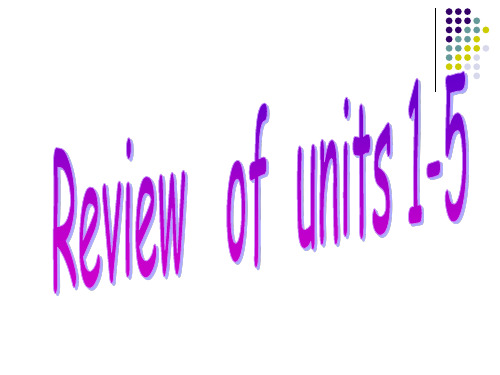
Remember: many—more—most few—fewer—fewest
修饰可数名词
much—more—most little—less—least
修饰不可数名词
What should I do?
我应该怎么办?
should:应该,一般是用来提出请求和建议。
同类型的词还有: could, shouldn’t 经常是用来 给出建议。
“There be”句型的一般将来时
肯定句: There will be +名词+其他成份 [注意]:无论后面加单数名词或复数形式,be都必须用原形。
There will be only one country.
否定句:在will后面加not.
There won’t be only one country.
★dress , have sth. on , wear , put on 它们都有“穿”、“戴”的意思。但用法不同。 have sth. on表示穿戴的状态。He had a straw hat on . 他戴了一顶草帽。 wear表示穿戴的状态。 She likes to wear the light green dress . 她喜欢穿浅 绿色的衣服。 put on表示穿戴的动作。 You’d better put on your overcoat before going out . 出门之前你最好穿上大衣。 dress既表动作也表状态。The mother is dressing her baby . 母亲正给她的婴儿穿衣服。
★borrow , lend 二者都有“借”的意思。 borrow是“借入”,指说话人向别人借东西给自己用, 常用于borrow sth from sb/somewhere 例如:Can I borrow your pen ? 我可以借你的钢笔吗? lend是“借出”,指说话人把自己的东西借给别人用, 常用于lend sth to sb结构。 例如:Lend me your pen , will you ? 把钢笔借给我 用用,可以吗?
人教版八年级英语下册 Unit 1-5单元词句梳理

Unit 1 What’s the matter?Period 1 Section A (1a-2d)必背单词1. matter n.问题;事情2. foot n.脚;足→ feet ( 复数)3. neck n.颈;脖子4. stomach n.胃;腹部→ stomachache n.胃痛;腹痛5. throat n.咽喉;喉咙6. fever n.发烧→ have a fever 发烧7. lie v.躺;平躺→ lay(过去式)→ lain(过去分词)→ lying(现在分词)8. rest v.& n.放松→ take/have a rest 休息一下9. cough n.&v.咳嗽→ have a cough 咳嗽10. X-ray n. X 射线;X 光→ take an X-ray 拍X 光片11. toothache n.牙痛→ tooth n.牙齿12. headache n.头痛→ have a headache 头痛13. break n.间歇;休息14. hurt v.(使)疼痛;受伤→hurt(过去式、过去分词)必背短语15. have a cold/stomachache 感冒/ 胃痛16. lie down 躺下17. take one’s temperature 量体温18. take breaks=take a break 休息必背句子19. Yeah, I think I sat in the same way for too long without moving.是啊,我想我保持同样的坐姿太久了而没动。
20. If your head and neck still hurt tomorrow, then go to a doctor.如果明天你的头和脖子还疼的话,就去看医生吧。
Period 2 Section A (3a-3c)必背单词1. passenger n.乘客2. off adv.& prep.离开(某处);不工作;从……去掉→ have a day off 休假一天3. onto prep.向;朝4. trouble n.问题;苦恼→ have trouble (in) doing sth. 做某事有困难5. hit v.(用手或器具)击;打→ hit(过去式)必背短语6. think twice 认真思考,权衡利弊7. get off 下车→ get on 上车8. wait for 等待;等候9. to one’s surprise 使……惊讶的是;出乎……的意料10. thanks to 多亏;由于→ thanks for 因……而感谢11. in time 及时→ on time 准时12. right away=at once 立即;马上13. agree to do sth. 同意做某事→ agree with sb. 同意某人(的意见或观点等)14. get into 陷入;参与必背句子15. She said that the man had a heart problem and should go to the hospital.她说这位老人有心脏病,应该去医院。
- 1、下载文档前请自行甄别文档内容的完整性,平台不提供额外的编辑、内容补充、找答案等附加服务。
- 2、"仅部分预览"的文档,不可在线预览部分如存在完整性等问题,可反馈申请退款(可完整预览的文档不适用该条件!)。
- 3、如文档侵犯您的权益,请联系客服反馈,我们会尽快为您处理(人工客服工作时间:9:00-18:30)。
37. 切除
cut off
38. 离开;从..出来get out of
39. 做决定 make a decision/decisions
40. 放弃
give up
41. 掌管; 管理 be in control of
42. 去爬山 go mountain climbing
43. 需要去做某事
need to do sth
44. 看见某人正在做某事 see sb.doingsth.
45. 询问某人某事
ask sb. sth.
46. 期望某人做某事 expect sb.to dosth.
47. 同意做某事
agree to do.
48. 帮助某人做某事 help sb. (to) do sth.
49. 想要做某事
want to do sth.
26. 对……产生影响
make a difference to
27. 自愿花时间某事
volunteer one’s time to do sth.
28. 放弃时间去做某事 give up +时间+ to do sth.
30. 被打击/晒伤 get/hit sunburned
31. 习惯于
be used to
32. 冒险
take risks/ take a risk
33. 把……放在某物上 put… on sth.
34. 因为
because of
35. 失去生命 lose one’s life
36. 用完; 耗尽 run out (of)
50. 告诉某人去做某事 tell sb. to do sth.
51. 做某事有困难
have problems (in) doing sth.
52.习惯于做某事
be/get used to doingsth.
53. 用某物去做某事
use sth. to do sth.
54. 好像做某事 seem to do sth. 55. 继续做某事 keep on doing sth. 56. 介意做某事 mind doing sth.
Yours,
Unit 2 I’ll help to clean up the city parks.
1. 分发
2. 打扫(或清除)干净
give out
3. (使)变得更高兴;振奋起来clean up
4. 建起;设立
cheer up
5. 赠送;捐赠
set up
6. 曾经……; 过去……
give away
Unit 1 What’s the matter?
1. 太多
too much
2. 躺下
lie down
3. 量体温
take one’s temperature
4. 看牙医
see a dentist
5. 做个X光检查 get an X-ray
6. 在……上敷药 put some medicine on…
摔倒
fall down
23. 踢足球
play soccer
24. 患有心脏病 have a heart problem
25. 几个;少数 a few
26. 造成麻烦 get into trouble
27. 做正确的事 do the right things
28. 进来
come in
29. 对…感兴趣 be interested in
15. 休息 take breaks/take a break
16. 等待
wait for
17. 多亏;由于thanks to
18. 没多想 without thinking twice
19. 及时
in time
20. 考虑
think about
21. 使…….惊讶的to one’s surprise
20. 制订计划做某事
make plans to do sth.
21. 要求某人(不要)做某事
ask sb. (not) to do sth.
23. 过去常常做某事
used to do sth.
24. 决定做某事 decide to do sth. 25. 有……感觉 get a feeling of…
7. 发烧
have a fever
8. 整个周末 all weekend
9. 玩电脑游戏 play computer games
10. 下车
get off
11. 看医生
go to a doctor
12.送某人去医院take sb. to the hospital
13. 到达
get to
14.立刻; 马上 right away
Unit 1 What’s the matter?
【话题•谈论健康和事故】谈论自己 的健康,发生事故时怎么做及如何 向他人提出建议和劝告,从而养成 良好的饮食和生活习惯。具体到书 面表达中要求同学们掌握描述人体 的不适,并提出正确的建议。
Dear Sally, I’m sorry to hear that you’re not feeling well these days. Are you still feeling tired now? I think you should drink a lot of hot water and have a good rest. You shouldn’t go to bed too late or work too late. Don’t be under too much pressure, and try to relax yourself. If you still don’t feel better, you should go to a doctor and take some medicine. I hope you will feel better soon.
7. 推迟
used to
8. 想出
put off come up with
9. 影响; 有作用 10. 张贴 11. 打电话给 12. 帮助……摆脱困难 13. 实现 14. 照顾; 照看 15. 参加选拔 16. 修理 17. 用光 18. 与……相像 19. 与……相似
make a difference put up call up help out come true care for try out for fix up run out of take after be similar to
